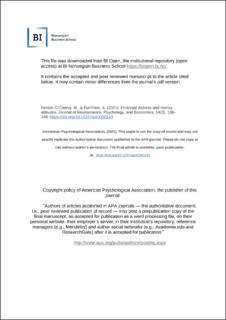Financial Distress and Money Attitudes
| dc.contributor.author | Fenton-O’Creevy, Mark | |
| dc.contributor.author | Furnham, Adrian | |
| dc.date.accessioned | 2023-08-02T12:35:48Z | |
| dc.date.available | 2023-08-02T12:35:48Z | |
| dc.date.created | 2021-11-25T18:14:24Z | |
| dc.date.issued | 2021 | |
| dc.identifier.citation | Journal of Neuroscience, Psychology, and Economics (JNPE). 2021, 14 (3), 138-148. | en_US |
| dc.identifier.issn | 1937-321X | |
| dc.identifier.uri | https://hdl.handle.net/11250/3082342 | |
| dc.description.abstract | This study was concerned with the construction and validation of a Financial Distress Index (FDI). A stratified (U.K.) sample of 2000 adults completed the new measure, as well as measures of financial anxiety, general stress, and money attitudes. The FDI correlated highly with general stress and financial anxiety, establishing concurrent validity. For the FDI, men scored lower than women, there was an inverse association with age, and the FDI was lower for the highest income bands. A unit increase in seeing money as security was associated with a reduction in the FDI of 16%, whereas unit increases in money as generosity, freedom, or power and status were associated with an increase in the FDI of, respectively, 21%, 24%, and 19%. Implications and limitations are discussed | en_US |
| dc.language.iso | eng | en_US |
| dc.publisher | APA | en_US |
| dc.title | Financial Distress and Money Attitudes | en_US |
| dc.type | Journal article | en_US |
| dc.type | Peer reviewed | en_US |
| dc.description.version | acceptedVersion | en_US |
| dc.rights.holder | APA | en_US |
| dc.source.pagenumber | 138-148 | en_US |
| dc.source.volume | 14 | en_US |
| dc.source.journal | Journal of Neuroscience, Psychology, and Economics (JNPE) | en_US |
| dc.source.issue | 3 | en_US |
| dc.identifier.doi | 10.1037/npe0000143 | |
| dc.identifier.cristin | 1959348 | |
| cristin.ispublished | true | |
| cristin.fulltext | postprint | |
| cristin.qualitycode | 1 |
